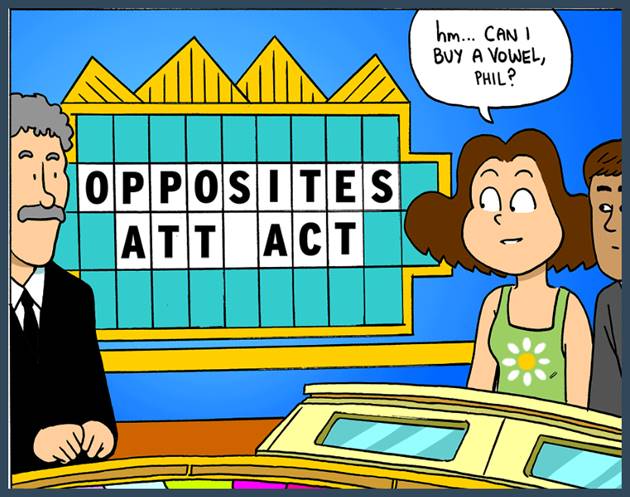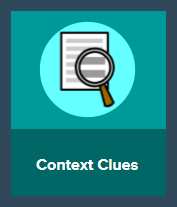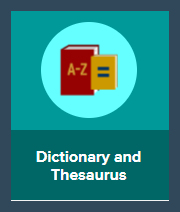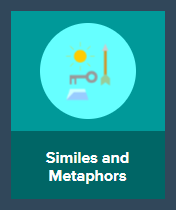Word Meanings

Context
Clues are using words around an unknown word to figure out the meaning.
Reading Literature and Informational Text
(11-12.4)
Determine
the connotative, denotative, and figurative meanings of words and phrases as
they are used in the text.
Let’s Practice: Key Terms
Section A: Context Clues
Context
Clues are using words around an unknown word to figure out the meaning. Context clues can help you improve your
vocabulary. When you see a word you don’t
know, it’s usually surrounded by words you do know. There are different ways to look for context
clues.
Ø Antonyms
o Its opposite can define mystery word
Ø Synonyms
o Mystery word by looking for words that mean the same thing
|
Read each sentence below, then identify
the underlined word to its meaning Word Bank Breathing heavily Covering Holding Sounding rough Lying Fastening together |
|
|
Tom was gasping because
the bag he was carrying was so heavy. |
Answer |
|
When trying to climb a tree, be sure you are grasping the branch
tightly. |
Answer |
|
Sally was still clasping her
suitcase together when the plane started boarding |
Answer |
|
The teacher's voice was rasping as
she gave out the homework assignment. |
Answer |
|
The smell of flowers was masking the other odors in the room. |
Answer |
|
While on vacation, Jill spent many hours basking in the sun on the
beach. |
Answer |
There will
be times that there just isn’t enough context to figure a word out. That is
when you should use a dictionary.
Let’s Practice: Context
Clues
Section B: Denotative and
Connotative Meanings
Every word
has both a denotative meaning and a connotative one as well. Denotation is
simply a fancy word for a word's literal definition according to a dictionary.
Think D for the dictionary. Denotative is a dictionary definition of a word. In
addition to denotative word meanings, words have connotative word meanings as
well, which is the emotional resonance of a word. Connotations can be thought of as the charges
a word has. A word can be charged positively, negatively, or neutrally.
In summary, denotation is the literal dictionary definition of a word, and a
connotation is the emotional resonances or suggestions that a word has its
charge.
Ø Denotative Word Meanings
o The literal dictionary definition of a word
Ø Connotative Word
Meanings
o The emotional depth of a word
o How does the word make you feel?
o It is a word that is charged positively, negatively, or neutral
|
Identify
the following terms as either an Emotional
Connotation or Neutral
Connotation. |
|
|
Brat |
Answer |
|
Child |
Answer |
|
Dad |
Answer |
|
Father |
Answer |
|
Female |
Answer |
Let's Practice: Dictionary and Thesaurus
Section C: Figurative Meaning
A figurative
language is a tool that authors use to convey many things, like tone or setting,
character, the mood, the atmosphere of a setting. When you come across
figurative language, you need to stop and think about what the author is trying
to show you through that figurative language.
Figurative language can be many things. These are things like similes
and metaphors, alliteration, assonance, cliches, hyperboles, idioms, and
personification.
Ø Figurative Language
o What is the author attempting to show?
o Tools of figurative language
§ Tone à the attitude the author
takes
§ Setting à The time and place of a story
§ Character à A person in a story
§ Mood à Feeling or atmosphere
that a writer creates for the reader
o Types of figurative language
§ Similes à comparison of things that have something in common using
"like" or "as"
§ Metaphors à comparison between two unlike things WITHOUT using like or as
§ Alliteration à repetition of initial consonant sounds
§ Clichés à phrases that are used over and over again and do not mean
anything
§ Hyperboles à exaggeration
§ Idioms à words and phrases that mean something different from the literal
meanings of the words
§ Personification à A figure of speech in which an object or animal is given human
feelings, thoughts, or attitudes
|
Identify
the item from the word bank to its corresponding match |
||||
|
Statement |
Answer |
Word Bank |
||
|
This is a comparison of two, unlike things using the terms
"like" or "as." |
? |
Allusion |
||
|
This is a direct comparison of two things, in which they are
said to be (in some sense) the same thing. |
? |
Figurative Language |
||
|
This is the reference to a person, place, or event from
history, literature, or religion with which a reader is likely to be
familiar. |
? |
Simile |
||
|
This is an extreme exaggeration used in literary work. |
? |
Metaphor |
||
|
? |
Oxymoron |
||
|
This is a phrase in everyday use that can’t be understood by
literal or ordinary meanings. |
? |
Idiom |
||
|
This is something which seemingly cannot be, yet it is; a
contradiction. |
? |
Hyperbole |
||
Let's Practice: Similes and Metaphors


